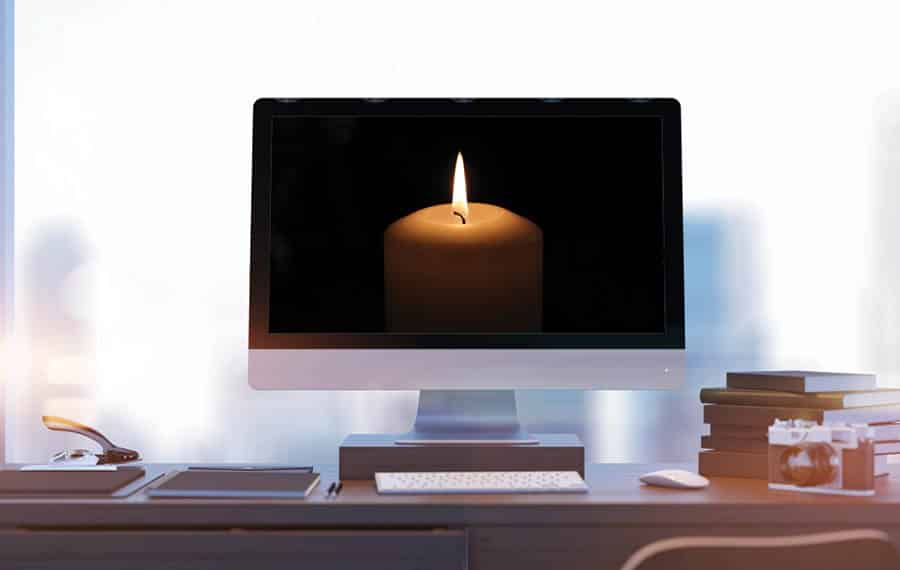
For many Jews who have lost loved ones, the Yizkor (Remembrance) service is an emotional time, providing a space for grief within the joyous celebration of certain big Jewish holidays.
Originally, Yizkor was said only on Yom Kippur, but over the years, additional Yizkor services were added as incentives for bringing more people to the sanctuary — leading to greater community connection and, some hope, for additional donations in memory of lost loved ones.
This year, as many communities in Los Angeles and worldwide use technology to gather, Yizkor — recited in most synagogues on the last day of Passover — also is migrating to the virtual space. For some communities, it’s a continuation of previous in-person traditions, altered to fit a Zoom screen. For others, the opportunity/challenge of using technology in some way has prompted a significant rethinking of this ritual built around gathering and memory.
At Temple Emanuel of Beverly Hills, the plan was to do a virtual healing service that also includes the temple’s more traditional Yizkor service components, Rabbi Jonathan Aaron told the Journal.
“Instead of a typical service to end Passover, we are offering a healing service”—with poetry, prayer and meditation — “for those who are ill, caregivers and family or friends who are tending to the sick,” he said. The service contains excerpts from classical Jewish texts including Psalms and the Zohar, modern thinkers such as Abraham Joshua Heschel and others, as well as some original readings Aaron penned.
After a Yizkor sermon, Aaron said, there would be “a short service to remember all those who have died since Yom Kippur and those family members who have passed away in years past.”
Temple Israel of Hollywood (TIOH) already had a tradition of switching off hosting duties for Yizkor services for Passover, Shavuot and Sukkot with Congregation Kol Ami, Rabbi Michelle Missaghieh told the Journal.
“Due to the stay-at-home ordinance, we are continuing to share this honor [over Zoom],” Missaghieh said. She will lead a Zoom Yizkor on April 15 at 9 a.m.; on Shavuot, Rabbi Denise Eger of Congregation Kol Ami will lead a Zoom Yizkor. “Such is the new world,” Missaghieh said.
“Yizkor is our ritual way of connecting with our loved ones beyond time and physical limits. How appropriate and necessary this ritual is in our current reality … grounding us in the past and guiding us in the present.” — Rabbanit Alissa Thomas Newborn
When the coronavirus first hit, IKAR already had started in-person grief circles co-led by members Dr. Barry Goldstein − a psychologist, mediator and coach − and Rabbi Barbara Zacky, who specializes in pastoral and spiritual care, IKAR Associate Rabbi Ronit Tsadok told the Journal. One of these groups will meet before Yizkor services via Zoom, in addition to having a separate Yizkor service that day.
Wilshire Boulevard Temple is planning a livestream with a rabbi and cantor, Rabbi Joel Nickerson told the Journal, and “trying to incorporate some voices from the community into the Yizkor service to try to provide that online space for some semblance of the [traditional] Yizkor experience.”
“In this new era, we have to be very open-minded about using technology,” said Rabbi Noah Farkas of Valley Beth Shalom, where they are using Zoom and broadcasting their Yizkor service to YouTube and Facebook Live. They also uploaded their Yizkor book and Scroll of Remembrance. They will use Zoom and its chat function “like a yahrzeit wall,” Farkas said, “using screen share for our prayers.” They also will have a conference line to make the experience accessible for those without internet. Farkas said the synagogue also is considering reading the names of those in their community who have died of COVID-19.
While the Orthodox community overall still doesn’t use technology on Shabbat and holidays, at least one modern Orthodox synagogue, B’nai David-Judea (BDJ), held its Yizkor service on Monday so it could use technology and not violate traditional Orthodox observance.
“We have never done Yizkor on chol hamoed before,” said BDJ’s Rabbanit Alissa Thomas Newborn. “We are doing Yizkor on a non-Yom Tov day so we can experience this important ritual as a community. But that is a product of the need to use technology, which we cannot do on Yom Tov. This is new because of the circumstances.”
Josh Sharfman, a BDJ member who created the Virtual Cantor website, led the service. Thomas Newborn also explained the recitation of Yizkor does not require a minyan, according to Orthodox Jewish law; only the Kaddish does, so “saying [Yizkor] in private” − on the last day of Passover when it would have ordinarily been recited at the synagogue – “is certainly permissible.”
“When connection in the flesh is elusive, it becomes all the more important to connect with the spirit,” Thomas Newborn said. “Yizkor is our ritual way of connecting with our loved ones beyond time and physical limits. How appropriate and necessary this ritual is in our current reality … grounding us in the past and guiding us in the present.”
“In this time of social isolation, I am constantly thinking of our active adults who have lost their partners, friends, even children, and want to remember their loved ones,” Farkas said. “Many are truly isolated now, not being allowed to even leave their rooms or apartments out of lethal fear. They need Yizkor now more than ever to connect them to their community and, in memory, to their family.”
Correction: This article has been updated to reflect that IKAR’s grief group met via Zoom prior to Yizkor services.























 More news and opinions than at a Shabbat dinner, right in your inbox.
More news and opinions than at a Shabbat dinner, right in your inbox.